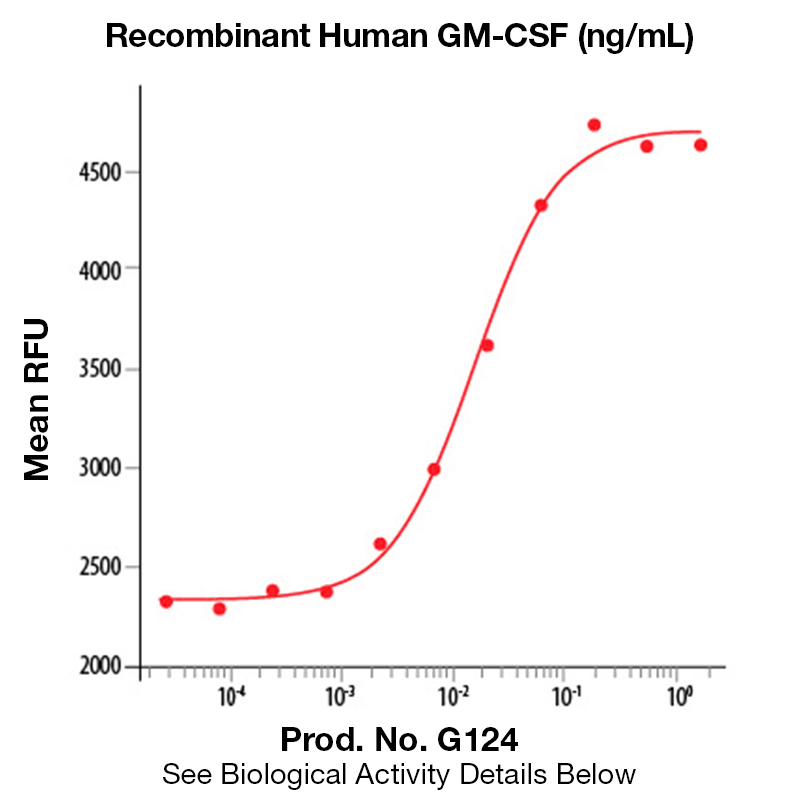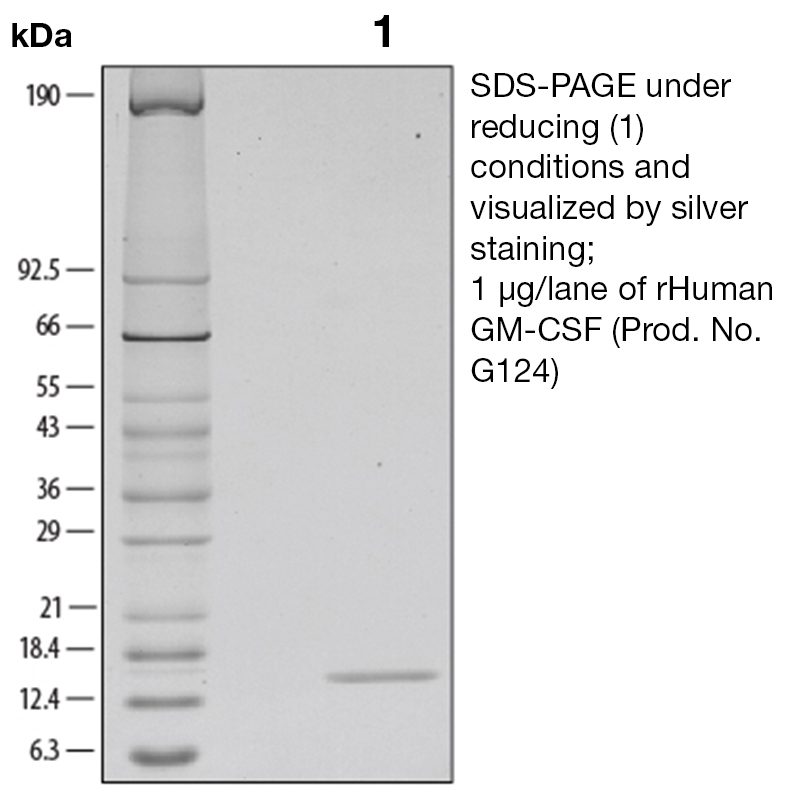Recombinant Human GM-CSF
Data
- -
- -
BackgroundGranulocyte-Macrophage Colony Stimulating Factor is a 22 kD, pleiotropic cytokine that is a white blood cell growth factor. It controls the production and function of blood cells by stimulating stem cells to produce granulocytes and monocytes. GM-CSF differs from G-CSF in that it affects more cell types including macrophages and eosinophils. Moreover, GM-CSF is part of the immune/inflammatory cascade, a process crucial for fighting infection. Interestingly, GM-CSF expression may have pathological implications. Autocrine expression of GM-CSF in myeloid leukemia cells is suspected to play a role in neoplasia, the formation of a new and abnormal growth of tissue. Additionally, GM-CSF expression has also been documented in certain solid tumors. There have also been reports of GM-CSF in synovial fluid from patients with arthritis suggesting that GM-CSF may play a role in tissue damage associated with the inflammatory process. Blocking GM-CSF is thought to have therapeutic potential by reducing inflammation. Some drugs are currently being developed to block GM-CSF. Protein DetailsPurity >97% by SDS-PAGE and analyzed by silver stain. Endotoxin Level <1.0 EU/µg as determined by the LAL method Biological Activity The biological activity of Human GM-CSF was determined by a cell proliferation assay using the factor-dependent cell line, TF-1 (Kitamura, T. et al., 1989, J. Cell Physiol. 140:323 - 343). The expected ED<sub>50</sub> for this effect is typically 6 - 30 pg/ml. Protein Accession No. CAA26822 Amino Acid Sequence apa rspspstqpw ehvnaiqear rllnlsrdta aemnetvevi semfdlqept clqtrlelyk qglrgsltkl kgpltmmash ykqhcpptpe tscatqiitf esfkenlkdf llvipfdcwe pvqe
N-terminal Sequence Analysis Ala18 State of Matter Lyophilized Predicted Molecular Mass The predicted molecular weight of Recombinant Human GM-CSF is Mr 14 kDa. Additionally, the actual molecular weight as observed by migration on SDS-PAGE is 14 kDa (reducing conditions). Predicted Molecular Mass 14 Formulation This recombinant protein solution was 0.2 µm filtered and formulated in modified Dulbecco’s phosphate buffered saline (1X PBS) pH 7.2 – 7.3 with no calcium, magnesium, or preservatives present. Storage and Stability This protein is stable for up to twelve months when stored at -20°C to -70°C. After thawing and addition of a carrier protein, this protein may be stored at 2°C to 8°C for one month or for long-term storage, aliquot and store at -20°C to -70°C in a manual defrost freezer. Avoid Repeated Freeze Thaw Cycles. See Product Insert for exact lot specific storage instructions. Country of Origin USA Shipping Next Day Ambient NCBI Gene Bank References & Citations1. Parker, MW. et al. (2008) Cell 134:496 2. Esnault, S. et al. (2002) Arch. Immunol. Ther. Exp. (Warsz.) 50:121 3. Yong, KL. et al. (1993) J. Immunol. 150:2449 4. Whitsett, JA. et al. (2002) Annu. Rev. Physiol. 64:775 5. Armitage, JO. et al. (1992) Sem. Hematol. 29:14 6. Eksioglu, EA. et al. (2007) Exp. Hematol. 35:1163 Certificate of AnalysisIMPORTANT Use lot specific datasheet for all technical information pertaining to this recombinant protein. |
Related Products
- -
- -
Prod No. | Description |
|---|---|
G665 | |
G675 | |
G596 | |
G128 | |
G117 | |
G672 | |
G681 | |
G119 | |
G124 | |
G142 | |
G691 | |
G143 |
 Products are for research use only. Not for use in diagnostic or therapeutic procedures.
Products are for research use only. Not for use in diagnostic or therapeutic procedures.




